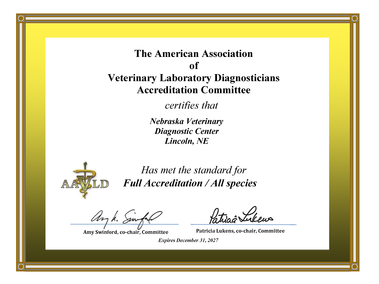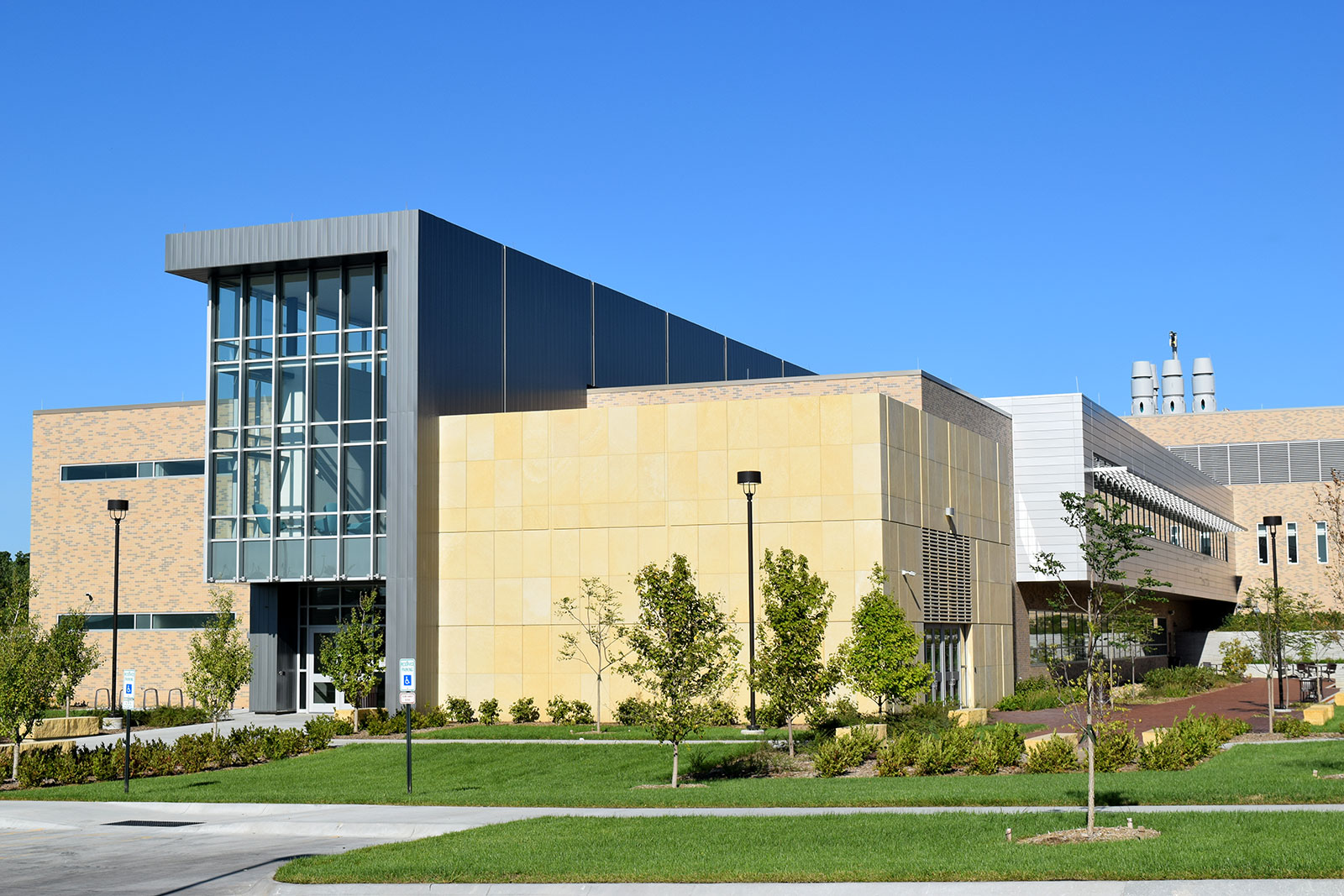Content
The Nebraska Veterinary Diagnostic Center (NVDC) employs state-of-the-art testing procedures to provide disease surveillance and diagnostic services to veterinarians, livestock producers, pet owners and researchers.
NVDC is recognized nationally for its expertise in diagnosing diseases in cattle and other food animals, and is Nebraska's only veterinary diagnostic lab accredited by the American Association of Veterinary Laboratory Diagnosticians, the United States Department of Agriculture and the National Animal Health Laboratory Network.
NVDC offers a full complement of bacteriologic, histologic, immunohistochemical necropsy, molecular diagnostic, serologic, toxicologic, electron microscopic and traditional virologic services. Laboratory cases are coordinated by and test results interpreted by faculty veterinarians. Our faculty diagnosticians have a wide range of nationally recognized expertise, and most have specialized training and board certification in disciplines including pathology, microbiology and immunology.
Hours of operation
Monday - Friday
8:00 a.m. - 5 p.m.
Phone & email
Phone: 402-472-1434
Email*: vdc2@unl.edu
*Emails sent to this address will be forwarded to the correct laboratory and/or faculty or staff member.
2026 Holiday Hours*
January 1–Closed
New Year's Day
January 19–Closed
Martin Luther King Jr. Day
May 25–Closed
Memorial Day
July 3–Closed
Independence Day
September 7–Closed
Labor Day
November 26-27–Closed
Thanksgiving
**December 24–Close at Noon
UNL Holiday Closedown
December 25–Closed
Christmas
*Changes may be made at any time.
**UNL Holiday Closedown details for December 26 - December 31, 2026, will be posted after Thanksgiving.
Veterinary medical questions?
Please consult your personal veterinarian if you have veterinary care or animal related questions. We are unable to provide that type of information.
Announcements
HPAI Detected in Dairy Herd
September 15, 2025—Please see the Nebraska Department of Agriculture press release and the USDA APHIS press release regarding confirmation of a case of highly pathogenic avian influenza in dairy cattle in central Nebraska.
NEW Payment Option
Paying just became faster and easier! NVDC now accepts online credit card payments.
To take advantage, look under the red Quick Links bar above for the “Online payment” button. When you click the button, you’ll be taken to a form that asks for contact information, the invoice(s) or statement number, and the amount to be paid. When finished, click the “Proceed to Checkout” button. You will be taken to a secure page where you can provide payment details. When submitted, you will see a receipt page, and a copy will be emailed to you.
Necropsy Guidance Document for NVDC Clients
Effectively relaying gross necropsy findings and pertinent clinical history is often vital to a successful diagnostic investigation. A document has been created to provide a template for veterinarians to submit written descriptions of gross findings observed during a field necropsy to help diagnosticians prioritize testing in a time efficient and cost-effective manner. Find the Necropsy Guidance Document on the Resources page.
Guidance for diagnostic testing for Highly Pathogenic Avian Influenza H5N1 virus in cattle
Recent USDA-APHIS regulations require that milk samples from lactating dairy cattle be submitted to a laboratory approved by the National Animal Health Laboratory Network (NAHLN) for Influenza A virus (IAV) PCR testing prior to interstate movement. The NVDC is approved by NAHLN to run this testing. If you have clinically ill or sick animals that may require testing, please contact the Nebraska Department of Agriculture (NDA) or USDA for instructions. Read article
HPAI Extension update
April 18, 2024—Dr. Matt Hille, a veterinary pathologist in the Nebraska Veterinary Diagnostic Center and an extension specialist, has written a brief summary of current information about the emerging H5N1 disease in U.S. dairy cattle.
As this is an emerging disease, new information is being collected and posted on the Nebraska Dairy Extension website.
Investigating the cause of cattle abortions: When to involve your veterinarian and what happens next
It’s fall, and for cow/calf producers throughout the region that often means it’s time to preg check. Confirming pregnancy in the herd is an important milestone in the overall cow/calf production system, but there’s still a lot that needs to go right before you’re admiring next year’s weaned calf crop. Unfortunately, reproductive losses can still happen between confirmation of pregnancy and calving. Beef producers and veterinarians often refer to any death loss before calving as an “abortion”, but in reality, true abortions only make up a portion of this loss. It is important to define some of the terms regarding reproductive losses: Continue reading
Tularemia--what you should know
Francisella tularensis or Tularemia is a bacterial pathogen on the CDC’s list of select agents due to its ability to cause rapid disease and death. The microorganism is endemic in this area of the US, and the NVDC sees several cases a year.
In summer, Tularemia should be considered as a differential diagnosis in acutely ill, febrile cats. Cats at increased risk for Tularemia include cats with outdoor access and cats that have access to rodents and rabbits. Additional clinical signs include a high WBC count, icterus, enlarged lymph nodes, splenic and liver masses or enlargement on ultrasound or palpation.
Since Tularemia is a zoonotic pathogen that can cause life-threatening illness in people, ruling out Tularemia is important. Tularemia can be spread through infected tissue aerosols or direct inoculation with infected material. If you suspect that you have been exposed to Tularemia, let your doctor know immediately.
In living cats, lymph node aspirates or blood can be cultured to confirm diagnosis. Lymph node aspirates should be inoculated into a bacterial culture tube. Ulcer swabs can also be cultured for Tularemia. Mark "Tularemia Suspect" on the submission form to prioritize testing. Do not submit syringes with infected material: it can endanger people who handle the syringes.
In cats that have died, submit the whole cat for necropsy and mark "Tularemia Suspect" on the submission form.
Cats are especially susceptible given that they are predators of rabbits and other small rodents that often harbor the organism; however, other species can also be infected. Tularemia can be transmitted via tick and deer fly bites.
For more information, refer to this website: https://www.cdc.gov/tularemia/index.html
Cutting-edge technology improves NVDC services
Nebraska's only AAVLD-certified lab

